by Brian Hioe
語言:
English
Photo Credit: 彭慧婉/Finger Media
Coming to Power as a Result of a Power Vacuum Not Just Once, But Twice
HUNG HSIU-CHU, former KMT presidential candidate, was elected party chairperson of the KMT this past Saturday. Hung won with 56.16% of the vote,or 78,829 votes, as compared to closest rival Huang Min-Hui’s 33.02% ,or 46,341 votes. However, turnout was low, with only 41.61% of KMT voters participating as compared to when Eric Chu ran for chairman unopposed last year with 56.34% turnout, and as compared to to a previous low of 53.75% in 2007 when Hung ran against Wu Poh-hsiung for the position in 2007.
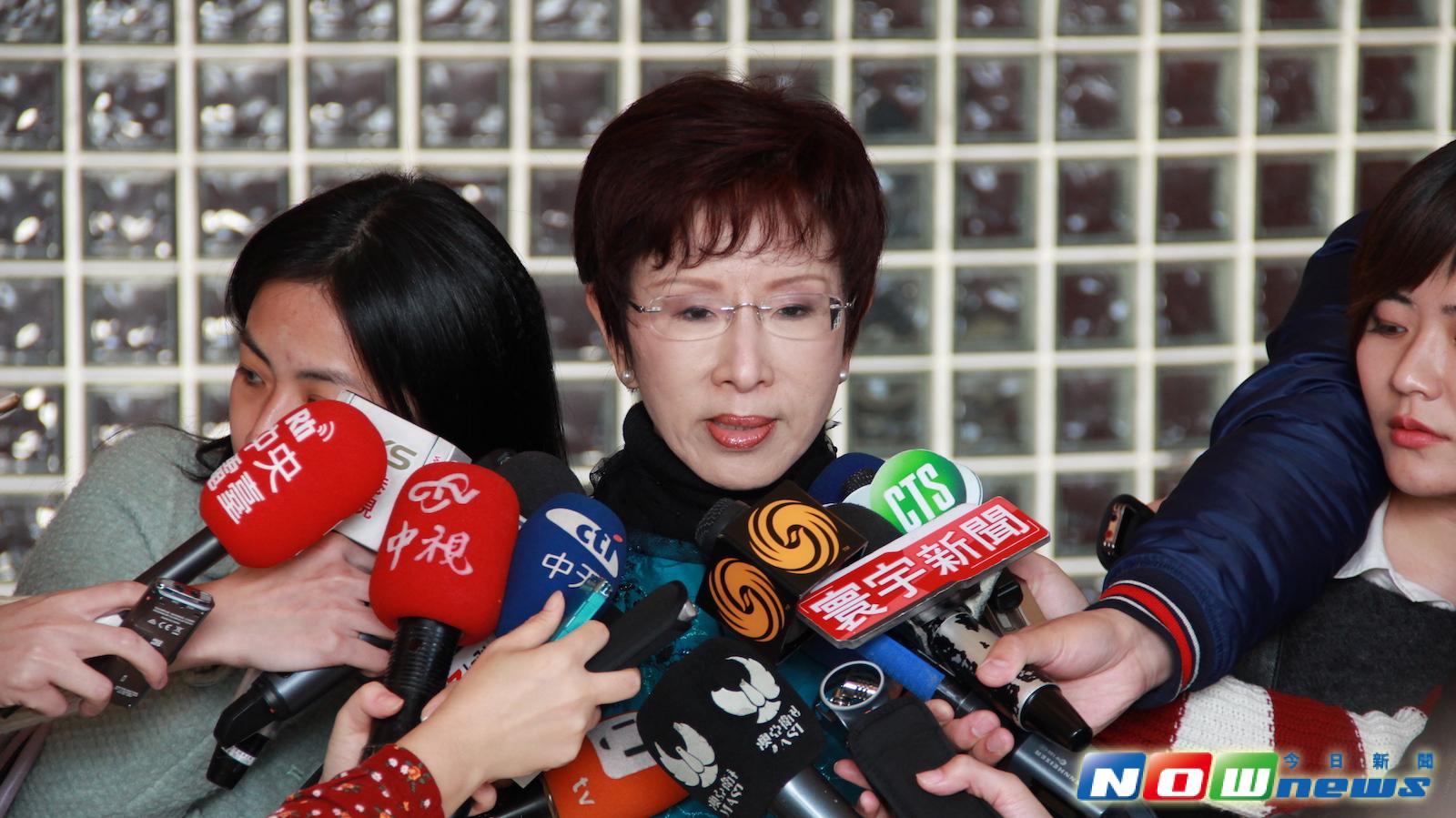 A victorious Hung being interviewed by reporters. Photo credit: NowNews
A victorious Hung being interviewed by reporters. Photo credit: NowNews
Hung’s victory was expected, seeing she was the frontrunner of the candidates running for party chairperson. In a year which already saw the election of Taiwan’s first female president, Hung will be the first female party chairperson of the KMT. Hung previously rose to fame from a position of being a relatively marginal figure after running for presidential candidate of the KMT. Hung gained the role at a time in which there was a power vacuum in the KMT and no party heavyweights were willing to toss their hats into the ring for fear of disrupting internal factional tension within the KMT.
Although Hung was later removed as presidential candidate of the KMT in light of poor projected results running against Tsai Ing-Wen of the DPP, her tenure served to elevate her to superstar status. This is in part why Hung polled so highly against competitors for KMT party chairmanship elections, although Hung’s victory is also in part because party heavyweights were also reluctant to or could not throw their hats into the ring this time, as well.
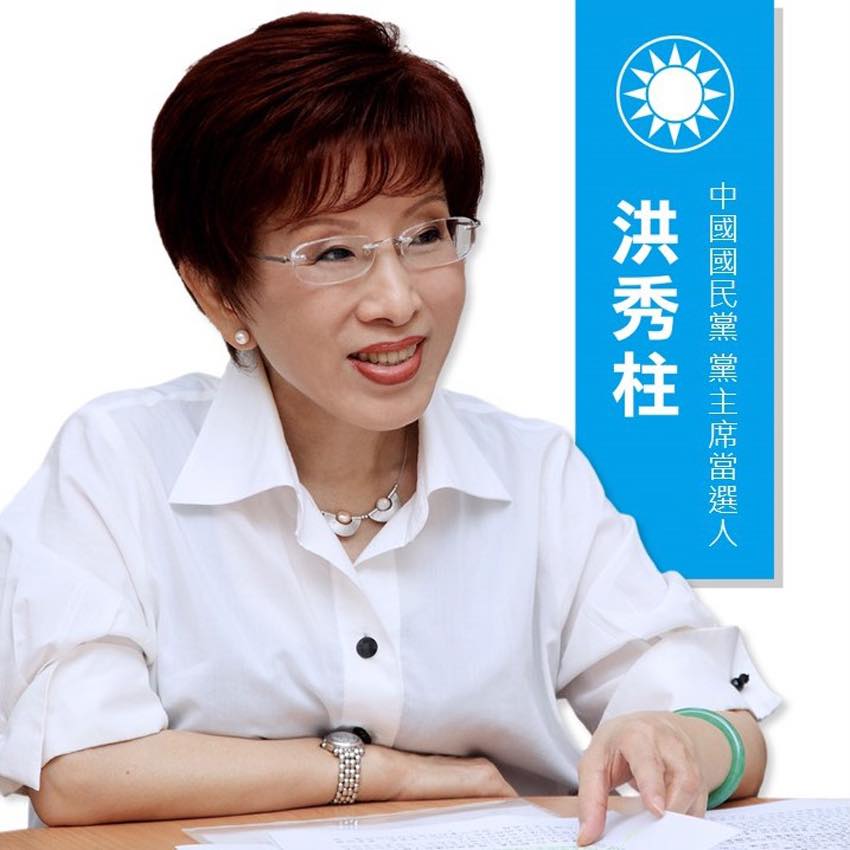 Photo credit: KMT
Photo credit: KMT
We did not see former Taipei mayor Hau Lung-Bin attempt to run for party chairman this time around, for example. It was initially a matter of some surprise that he did not seek to run when Hau would have had the support of the pro-China “Old Soldier” faction of the KMT. But the KMT is also facing the problem that its former party heavyweights are no longer so viable as political candidates. A run by Hau would have been tainted by Hau’s inability to win a legislative seat in Keelung during 2016 legislative elections, for example.
Outgoing Taiwanese president Ma Ying-Jeou resigned as KMT party chairman after the defeat of nine-in-one elections. KMT presidential candidate and New Taipei City Mayor Eric Chu, who replaced Hung as presidential candidate of the KMT, resigned as party chairman after his defeat in 2016 elections. Wang Jinpyng, leader of the “Taiwanese” faction of the KMT, remains unpopular in the mainstream of the party given that he is seen as too close to the DPP and is prevented from taking party leadership because of his being native Taiwanese and not a mainlander. So once again, much like how Hung became presidential candidate of the KMT the first time around, it is a power vacuum which allowed Hung to take the chairmanship of the KMT.
A Controversial Political Candidate, But Not Without Supporters
HUNG BECAME known during her stint as presidential candidate of the KMT for numerous controversial statements and unchecked political gaffes. Hung, for example, did not seem to understand many of the international powers with vested interests in cross-strait relations cling to the KMT’s fictitious construct of the “1992 Consensus” as a guarantor of stability.
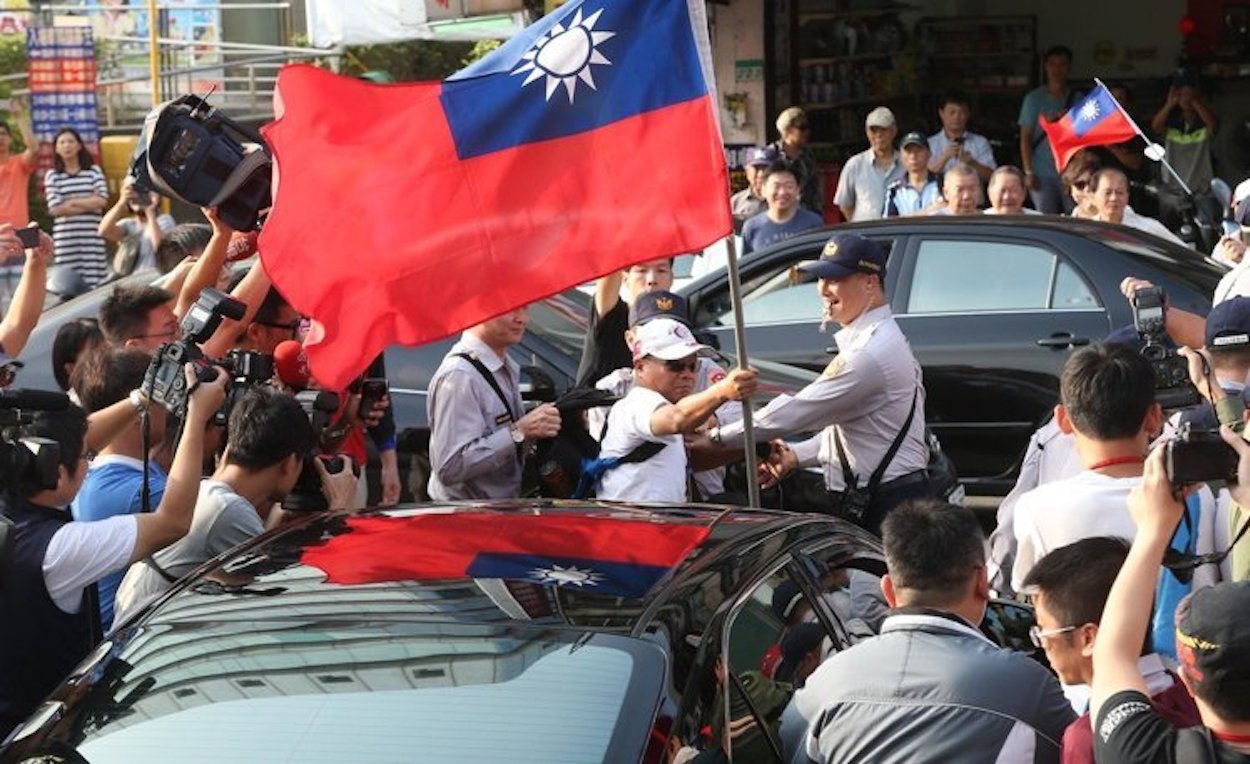 Hung supporters fighting with police outside of KMT headquarters in September 2015 after her removal as presidential candidate of the KMT. Photo credit: UDN/林俊良
Hung supporters fighting with police outside of KMT headquarters in September 2015 after her removal as presidential candidate of the KMT. Photo credit: UDN/林俊良
While claiming that China and Taiwan had agreed that there was “One China” but “two interpretations” of what that China was as a result of the China’s Association for Relations Across the Taiwan Strait (ARATS) and the Taiwan’s Straits Exchange Foundation (SEF), this was in fact made up by the KMT. But this fiction has become a reference point for cross-strait relations between both Taiwan and China, with even the DPP under Tsai Ing-Wen seeming now to accept some version of the 1992 Consensus despite that the DPP had historically denied its existence. Hung, however, seemed to understand little of the significance of the 1992 Consensus and instead tried to insist on something she referred as “One China, Same Interpretation”, actually going against the KMT party platform. Hung was later forced to back down and, returning to the KMT party line, later came to accept and reiterate the importance of the 1992 Consensus.
But Hung’s removal as presidential candidate was no small matter of controversy within the KMT. Hung became a political candidate which gave voice to the “deep Blue” elements of the KMT who chafed after the party’s defeat in 2014 nine-in-one elections and the blowback the party had seen since the Sunflower Movement. Hung’s removal as presidential candidate of the KMT led to Hung supporters demonstrating outside KMT headquarters, attempting to prevent vehicles of the KMT Central Committee from leaving the building, and clashing with police.
The KMT released a campaign ad late during the 2016 election cycle, stressing that Hung Hsiu-Chu continued to endorse Eric Chu for presidency
Indeed, the rise of diehard Hung supporters within the KMT would be another reason for Hung’s victory as party chairperson at present. After Hung’s replacement as presidential candidate of the KMT by Eric Chu, which was in itself a messy process, the KMT still had to make it clear that Hung was still a loyal member of the party and that she would, as a loyal member of the party, throw her support behind Chu—and so diehard Hung supporters should follow suit, rather than refuse to vote for Eric Chu out of a sense of betrayal.
The Stalling of Internal Reform Efforts Under Hung?
HUNG’S VICTORY as party chairperson of the KMT probably indicates that reform efforts within the KMT will stall. Hung’s rise to party chair is with the backing of ideologically doctrinaire “deep Blue” elements, who feel under attack in the present political climate, particularly from young people.
Shortly before voting for the chairmanship election, for example, Hung would make it a point to stress the need to oppose young people caught in illusions of Taiwanese independence, as though this were the greatest danger in Taiwanese politics at present. But it is of course that the KMT’s viability as a political party is threatened by its inability to appeal to young people, efforts by young KMT members to reform the party having been stymied, with such individuals being accused of being closeted pan-Green traitors.
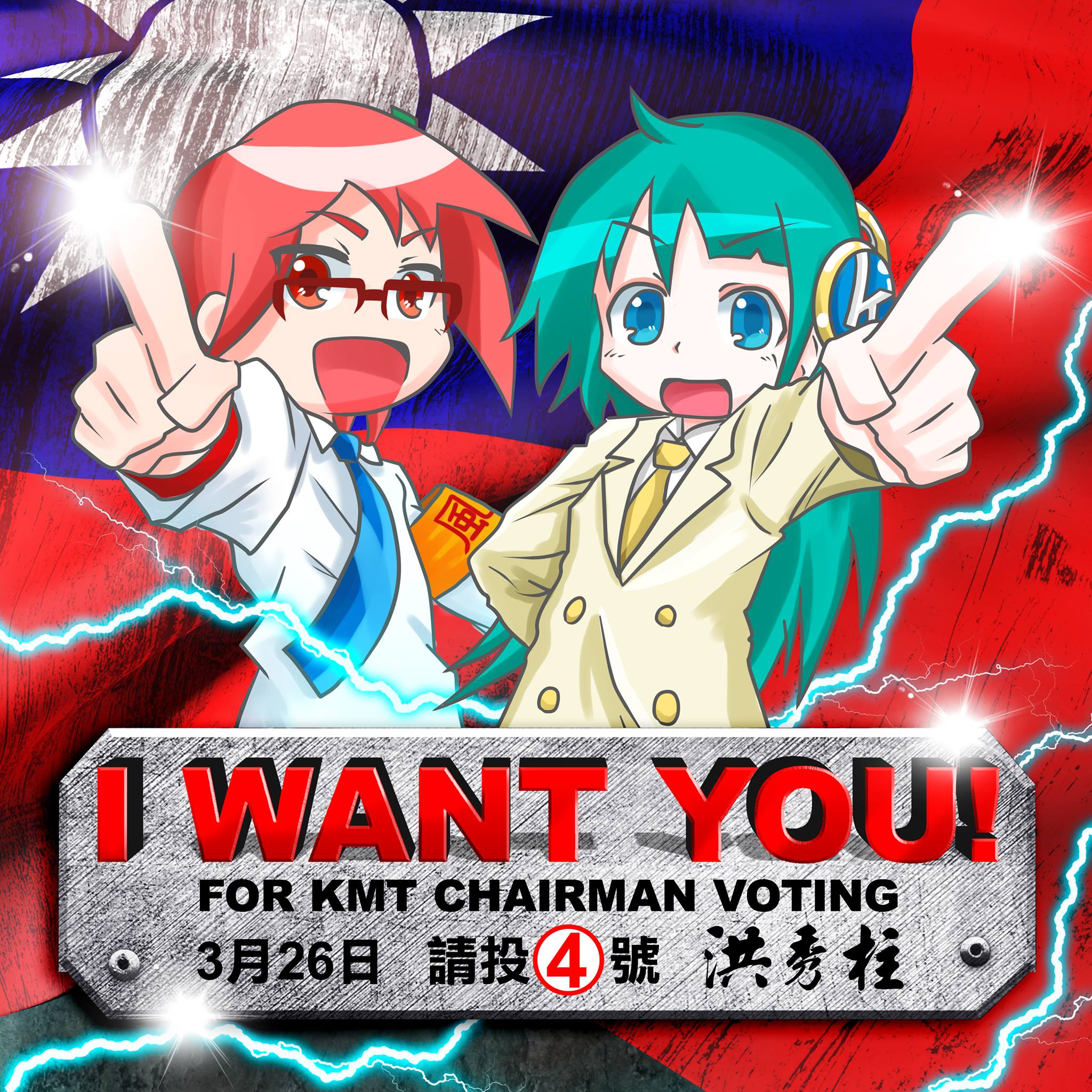 Hung’s use of Japanese anime-style art in campaigning, possibly in imitation of DPP candidate Tsai Ing-Wen’s successful use of anime-style art, was likely an attempt to appeal to the young. Photo credit: Hung Hsiu-Chu
Hung’s use of Japanese anime-style art in campaigning, possibly in imitation of DPP candidate Tsai Ing-Wen’s successful use of anime-style art, was likely an attempt to appeal to the young. Photo credit: Hung Hsiu-Chu
It may be that Hung as KMT party chair will only serve to deepen the ongoing crisis of the KMT. Unless Hung learns to moderate herself, Hung will have little ability to make bipartisan appeals across the political spectrum. Hung has acquired a reputation for ethnic chauvinism against native Taiwanese because of past incidents of scoffing at the pronunciation of Taiwanese and through cutting the funds for Taiwanese education programs. And what we saw from past elections is precisely the KMT’s inability to reach across political lines in Taiwan because of the perception of pro-mainlander and pro-China bias.
The paradox would be that Hung would not stymie reform efforts on the basis of failing to realize the need for the KMT to change course, or because she would attempt to put down dissenting voices. Rather, what we would more likely see under Hung is the view that the way for the KMT to get out of its current rut is to simply return to the good old ways of the past, without realizing the need to radically change or face party collapse.
Perhaps Hung, then, will only provide for hastening the collapse of the KMT. Certainly, if the KMT faces the challenge of either localizing or facing demise, Hung’s victory would seem to indicate that the KMT will not make any attempt to localize. On the contrary, some in Taiwan have suggested that Hung’s chairmanship foreshadows that the KMT will undergo a process of “New Party-ification” under her leadership, meaning that there will be a political hardening of the KMT according to deep Blue ideology which would bring the KMT closer in line with the New Party. Or it is possible that the KMT may fracture, with more moderate elements leaving the KMT because of Hung’s ideological extremism. Previously, before Hung became the frontrunner for KMT party chairperson, it was speculated that Hung would provoke a split in the KMT where she would lead an exodus of deep Blue elements to join the New Party.
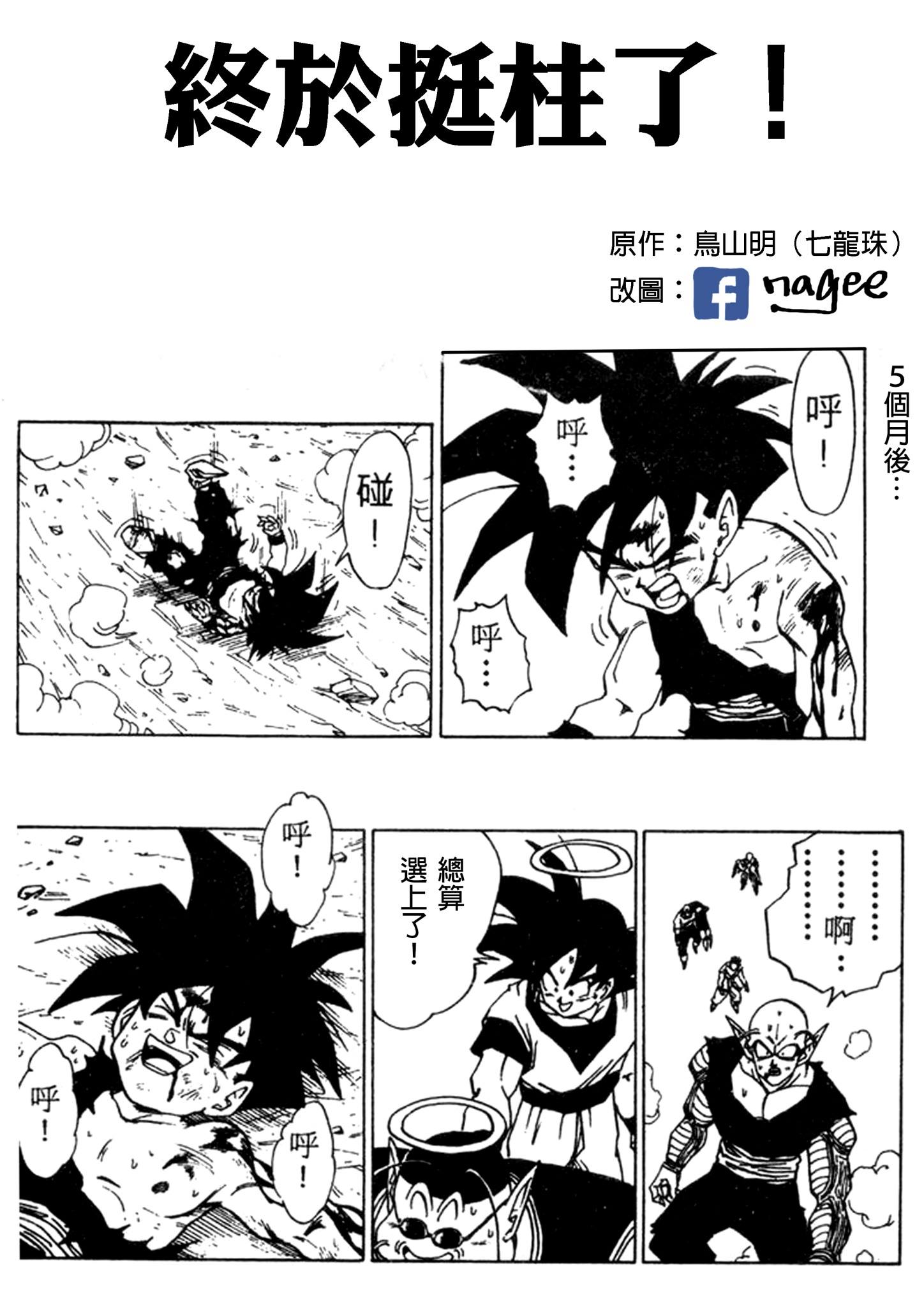 The preceding meme, consisting of panels with changed dialogue from Japanese manga Dragon Ball Z, would be circulated on activist circles online after Hung’s victory, jokingly celebrating Hung’s victory. Photo credit: Nagee
The preceding meme, consisting of panels with changed dialogue from Japanese manga Dragon Ball Z, would be circulated on activist circles online after Hung’s victory, jokingly celebrating Hung’s victory. Photo credit: Nagee
Indeed, whether commentators on Taiwanese politics or even among Taiwanese youth activists themselves, some have thus celebrated the victory of Hung Hsiu-Chu as another nail in the coffin of the KMT. Paradoxically, among Taiwanese youth activists, this view also comes a sense of the awareness that Hung is an honest politician who—however ethnically chauvinistic or reactionary in the sentiments she expresses—differs from KMT politicians such as Ma Ying-Jeou or Eric Chu, who may come across as more moderate, but are career politicians skilled at political subterfuge and putting on false appearances. Hung, at the very least, says what is directly on her mind. The comical nature of Hung’s numerous political gaffes is also another factor in Hung being strangely well-liked on the other side of the political aisle.
KMT-CCP Relations Under Hung: A Potential Danger?
HOWEVER IT MAY also be dangerous taking Hung so lightly. Hung was congratulated immediately after her victory by Chinese president Xi Jinping, in his capacity as CCP party chairman, in a message which also included a veiled warning to Tsai Ing-Wen. This may be indicative of that the CCP still intends to carry on a special party-to-party relationship with the KMT, going above its official diplomatic relations with Taiwan. After all, although Ma Ying-Jeou met with Xi Jinping in Singapore in November 2015 in their capacity as presidents of Taiwan and China respectively, before that in May 2015, Eric Chu met with Xi Jinping in Beijing in their capacities as party heads of the KMT and CCP. Hung was a part of Chu’s entourage during that meeting.
Both the CCP and KMT have in the past emphasized their special party-to-party relationship. This is used as a means of influencing Taiwanese politics, by raising the specter of possible cross-strait provocations and holding up the KMT as the only political party in Taiwan capable of maintaining stable relations with Beijing. One wonders how successful this will be in the future, seeing as past elections proves that the issues most important to Taiwanese at present are domestic in nature, rather than in regards to cross-strait relations.
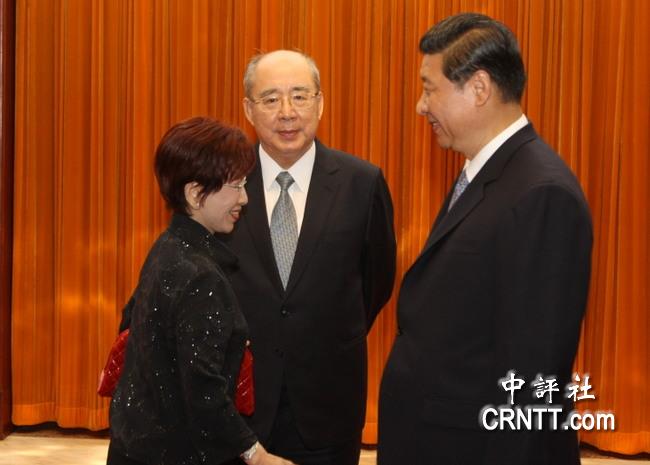 Hung meeting Xi Jinping in May 2015 as part of Eric Chu’s entourage. Photo credit: CRNTT.com
Hung meeting Xi Jinping in May 2015 as part of Eric Chu’s entourage. Photo credit: CRNTT.com
Likewise, although the Ma-Xi summit provoked strong reactions from civil society, the overall public was more positive in reception, seeing as Ma and Xi met in their capacities as presidents of Taiwan and China. On the other hand, the Chu-Xi meeting was seen by many in the political mainstream as a betrayal by the KMT, in which the KMT sought to go around and override the proceedings of the Taiwanese government undemocratically.
But in the political reality after 2016 elections, if China does not accommodate itself to Tsai Ing-Wen and instead attempts to bet on the KMT being able to win back its losses in the future, it is likely that China would try to pin its hopes on Hung. It is noteworthy to what extent Chinese state media circulated the view that Hung the “last hope” for Taiwanese reunification with China during her stint as presidential candidate. Hung was promoted, in fact, in a way that Eric Chu was not subsequently and Chinese state media sought to depict Hung as a capable politician when, of course, she has proved herself as anything but through her many political gaffes. This was a view that Chinese nationalists without any real knowledge of Taiwan which is not secondhand in nature have taken up. Perhaps Hung will now be played up as a politician capable of turning the KMT around.
The CCP attempting to support Hung could, of course, also just incite further blowback against the KMT. However, we will see in this way as to whether the Hung chairmanship, rather than simply marking the comical decline of the KMT, could in fact still have some ramifications where cross-strait relations are concerned.


 A victorious Hung being interviewed by reporters. Photo credit: NowNews
A victorious Hung being interviewed by reporters. Photo credit: NowNews Photo credit: KMT
Photo credit: KMT Hung supporters fighting with police outside of KMT headquarters in September 2015 after her removal as presidential candidate of the KMT. Photo credit: UDN/林俊良
Hung supporters fighting with police outside of KMT headquarters in September 2015 after her removal as presidential candidate of the KMT. Photo credit: UDN/林俊良 Hung’s use of Japanese anime-style art in campaigning, possibly in imitation of DPP candidate Tsai Ing-Wen’s successful use of anime-style art, was likely an attempt to appeal to the young. Photo credit: Hung Hsiu-Chu
Hung’s use of Japanese anime-style art in campaigning, possibly in imitation of DPP candidate Tsai Ing-Wen’s successful use of anime-style art, was likely an attempt to appeal to the young. Photo credit: Hung Hsiu-Chu The preceding meme, consisting of panels with changed dialogue from Japanese manga Dragon Ball Z, would be circulated on activist circles online after Hung’s victory, jokingly celebrating Hung’s victory. Photo credit: Nagee
The preceding meme, consisting of panels with changed dialogue from Japanese manga Dragon Ball Z, would be circulated on activist circles online after Hung’s victory, jokingly celebrating Hung’s victory. Photo credit: Nagee Hung meeting Xi Jinping in May 2015 as part of Eric Chu’s entourage. Photo credit: CRNTT.com
Hung meeting Xi Jinping in May 2015 as part of Eric Chu’s entourage. Photo credit: CRNTT.com